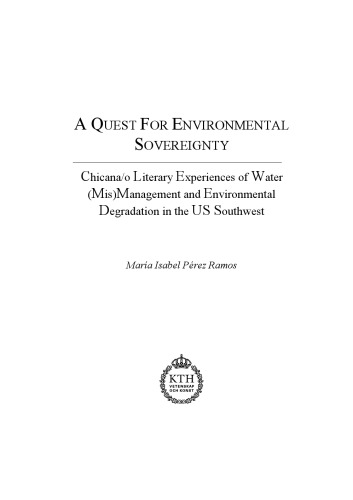Product desciption
A Quest For Environmental Sovereignty Chicanao Literary Experiences Of Water Mismanagement And Environmental Degradation In The Us Southwest Mara Isabel Prez Ramos by María Isabel Pérez Ramos 9789177293866, 917729386X instant download after payment.
The U.S. Southwest is a semi-arid region affected by numerous environmental problems such as overgrazing, deforestation, water mismanagement, toxic pollution, and anthropogenic climate change. Chicana/o communities, traditionally linked to agriculture, ranching, and forestry, have been directly affected by such problems, especially ever since the region was annexed from Mexico by the United States in the mid-nineteenth century. From this moment onwards they lost their environmental sovereignty, mostly through their dispossession of the natural resources, losing the power to influence the environmental ethics and practices that have been shaping the region for more than 150 years now.
This environmental humanities dissertation explores the ways in which Chicana/o culture is interconnected with environmental practices and sites in subaltern literary works about the Chicana/o experience. It does so from an ecocritical perspective articulated in terms of environmental justice through postcolonialism and decolonial theory, and informed by environmental history, regional/ethnic studies, and political ecology. The analysis focuses on the ethics, politics, and practices around water (management), for water is a key natural resource (especially in the semi-arid Southwest) and a central element of Chicana/o cultural identity. This dissertation also investigates how the hegemonic Anglo- American environmental, political, and economic practices have challenged and undermined Chicana/o culture, identity, and wellbeing, and how this has been addressed in fiction. It questions whether establishing such a connection adds any useful insights to the larger discussion on the global socio-environmental crisis, and how does literature contribute to deconstructing and countering the crisis. This research also analyzes the writer activist character of the subaltern narratives of the corpus, with attention to the relevance of rhetoric in subverting and constructing environmental discourses and ethics. Furthermore, it analyzes regional and border narratives, as well as fiction and non-fiction narratives about the socio-environmental struggles of other ethnic minorities in the Southwest and in other parts of the world, putting literature about the Chicana/o experience in a regional, national, and transnational context.
The four research papers address ongoing debates about the developmental paradigm at work in the U.S. Southwest, and its impact on communal and traditional irrigation systems; futuristic projections of current water management legislation and practices in Southwestern urban ecologies; pollution, toxicity, and resource dispossession affecting the environmental health and wellbeing of ethnic minorities in the Southwest; and subaltern (writer) activist narratives deconstructing and subverting the rhetoric that legitimizes dam construction around the world. They explicate how social and environmental dimensions are interconnected in the thinking and identity of Chicanos/as and other subaltern cultural groups. They moreover explore the pivotal role of literature in reclaiming environmental sovereignty, in asserting cultural identities, and in countering the environmental crisis by imagining alternative managerial practices and socio-environmental relations, as much as in challenging cultural hegemonies.


